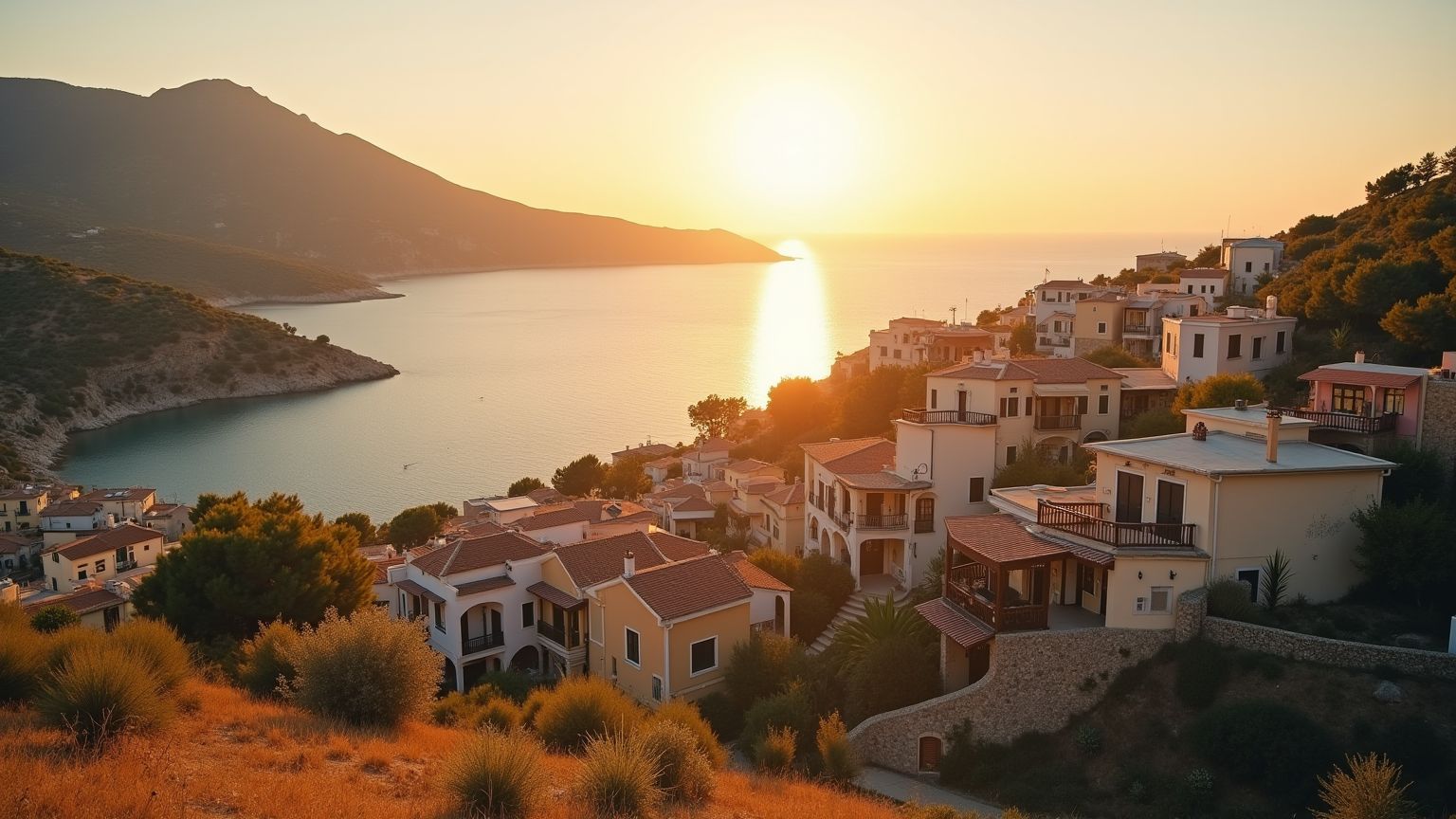The Remarkable Transformation of Tolo Greece: From Sleepy Village to Tourist Paradise
Ever wondered how a tiny fishing settlement evolved into one of Greece's most beloved vacation spots? The story of Tolo Greece is nothing short of fascinating - a genuine rags-to-riches tale that unfolded along this picturesque stretch of the Peloponnese coastline.
As someone who's witnessed Tolo's evolution firsthand (I still remember my grandfather pointing out where fishermen once dried their nets where luxury hotels now stand), I'm excited to share how this magical corner of Greece reinvented itself while keeping its soul intact.
Humble Beginnings: Tolo's Fishing Village Roots
Picture this: just a handful of weathered stone houses hugging a crescent-shaped bay, fishing boats bobbing gently in crystal waters, and nets spread out to dry along the shoreline. That was Tolo Greece before tourism transformed everything.
The original settlement dates back centuries, with locals making their living almost exclusively from the sea. My neighbor Yannis, now in his 90s, still tells stories of those pre-tourism days - waking before dawn to check his nets, the smell of salt and pine mingling in the morning air, and the simple rhythm of life dictated by weather and seasons rather than hotel bookings.
"Before the big hotels came, we knew every pebble on the beach," Yannis often says with a wistful smile. "Tolo was just us and the sea."
The Turning Point: When Travelers Discovered Tolo Greece
The transformation began quietly in the late 1950s and early 1960s. A few adventurous travelers, seeking alternatives to the already-crowded islands, stumbled upon this hidden gem:
- Its perfect crescent beach with shallow, child-friendly waters
- The spectacular views across to three small islands
- Its convenient location near ancient treasures like Mycenae, Epidaurus, and Nafplio
- The authenticity of a real Greek fishing village
Word spread, particularly in Northern European countries where travelers were hungry for sunny Mediterranean escapes. Soon, the first small guesthouses appeared, often just spare rooms in fishermen's homes offered to summer visitors.
The Building Boom: How Modern Tolo Greece Took Shape

By the 1970s and 80s, Tolo's transformation accelerated at breakneck speed. The dusty coastal road that once connected fishing huts transformed into the main tourist strip. Family-owned tavernas multiplied along the waterfront, and those first modest guesthouses evolved into proper hotels.
I remember my father pointing to the hillsides above Tolo Greece during this period, saying, "Watch that space." Sure enough, as beachfront property became scarce, development climbed upward, with new accommodations offering those coveted sea views.
🏨 Hotel options in Tolo expanded dramatically:
- Family-run guesthouses with home-cooked breakfasts
- Mid-range hotels with swimming pools
- Luxury resorts with full amenities
- Self-catering apartments for independent travelers
- Camping facilities for budget-conscious visitors
What makes Tolo's story remarkable isn't just that it grew, but how it grew. Unlike some overdeveloped resorts, Tolo managed to expand while maintaining its character. You'll still find fishing boats mixed among the pleasure craft, and authentic tavernas where locals outnumber tourists, especially in the off-season.
Today's Tolo: A Perfect Balance of Old and New
Modern Tolo Greece strikes a wonderful balance. The beach remains the star attraction - a 2-kilometer stretch of golden sand with shallow, warm waters that families particularly appreciate. But now it's lined with sunbeds, watersport facilities, and beach bars serving everything from traditional Greek coffee to elaborate cocktails.
The main street buzzes with activity from April through October - gift shops selling local handicrafts, restaurants offering everything from traditional Greek cuisine to international favorites, and ice cream parlors that stay open late into those warm summer evenings.
Yet somehow, miraculously, you can still find pockets of the original Tolo. Wander just a few streets back from the beach, especially in the western end of town, and you'll discover quiet neighborhoods where elderly yiayias (grandmothers) still sweep their doorsteps each morning and the scent of homemade bread wafts from kitchen windows.
Why Tolo Greece Succeeded Where Others Failed
Not every fishing village that attempts a tourism transformation succeeds, so what made Tolo different? I think it comes down to a few key factors:
- Location, location, location - Tolo's proximity to major archaeological sites made it ideal for history-loving travelers
- Natural beauty that speaks for itself - That perfect bay with island views sells itself in photographs
- Family-focused development - Many businesses remained in the same families across generations
- Seasonal balance - While bustling in summer, Tolo returns to its authentic self in winter months
- Accessibility - Just 2 hours from Athens, making it an easy weekend destination
The locals of Tolo Greece managed something remarkable - they embraced change without abandoning their identity. The fisherman's son might now run a hotel instead of sailing at dawn, but the connection to the sea and the community spirit remains intact.
Visiting Tolo: What Makes It Special Today
If you're considering a visit to Tolo Greece (and you absolutely should), you'll find a destination that offers something increasingly rare in our globalized world - authenticity wrapped in comfort.
The beach scene is lively without being overwhelming. You can still find quiet spots even in high season if you're willing to walk a bit further along the shore. Water activities abound - from gentle pedal boats for families to more adventurous jet skis and paragliding for thrill-seekers.
Accommodation options suit every budget, and the food scene deserves special mention. From the catch-of-the-day specials at waterfront tavernas to family recipes passed down through generations, eating in Tolo connects you to both its fishing past and its cosmopolitan present.
Don't miss taking the small boat trip to the islands visible from shore - Koronisi, Romvi, and Daskalio each have their own stories to tell, including a tiny Byzantine chapel and ruins of an ancient sanctuary.
The Soul of Tolo: People Make the Place
What truly sets Tolo Greece apart isn't its facilities or even its natural beauty - it's the people. Tourism here developed organically, with locals converting their homes and adapting their livelihoods rather than outside developers sweeping in with grand plans.
This means when you chat with your hotel owner, they're likely telling stories about their grandfather fishing from the same shore. The restaurant owner probably learned to cook from their mother, who learned from her mother before that.
These personal connections give Tolo an emotional depth missing from purpose-built resorts. You're not just staying in a tourist facility; you're being welcomed into a community with real history and authentic culture.
The Future of Tolo: Sustainable Growth
Looking ahead, Tolo Greece faces the same challenges as many successful tourist destinations - how to continue developing without losing the very qualities that made it special.
Recent initiatives focus on sustainability - reducing plastic waste on beaches, investing in renewable energy for hotels, and promoting local food producers to reduce the carbon footprint of importing goods.
There's also a growing emphasis on extending the tourist season beyond the summer months, highlighting autumn and spring as ideal times to explore nearby historical sites without the crowds and heat of July and August.
As someone who's walked Tolo's shore through all its incarnations, I'm optimistic about its future. The same practical wisdom that guided local families from fishing to tourism seems to be steering them toward a sustainable model that preserves both natural beauty and cultural heritage.
If you've never experienced Tolo Greece, consider this your invitation to discover one of the Mediterranean's most remarkable success stories - where tradition and progress walk hand in hand along a golden shore.








